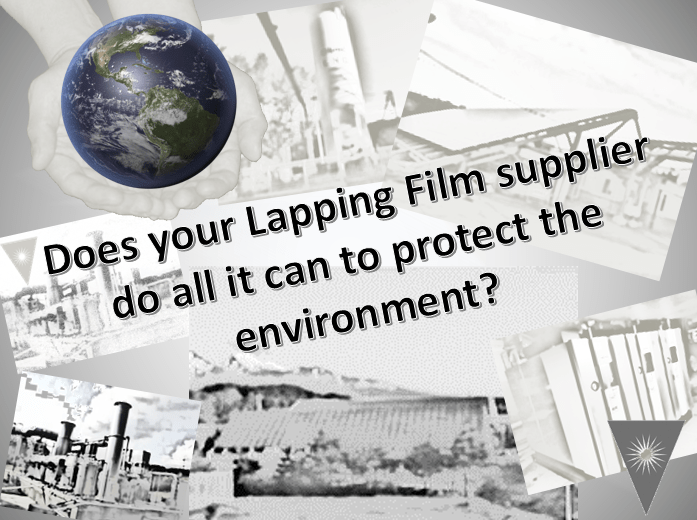Fiber Optic Center is committed to choosing suppliers that value the environment. Almost all manufacturing processes produce waste. With thoughtful engineering, the toxicity of this waste can be diminished. Making lapping film is no different. When Fiber Optic Center chooses a supplier, we make sure they have these same values.
In the fiber optic industry, lapping film is nothing more than high-tech sandpaper used to polish fiber optic connectors, optics and other substrates in optimizing the coupling, launching or collecting of photons. Of course, there is a much greater need for consistency and smaller particle size to polish fiber optics rather than to polish a nice oak dresser.
To make this high-tech lapping film, first hyper-pure compounds, such as aluminum oxide, silicon carbide, silicon dioxide or diamond, are filtered and sorted by size. These materials are mixed into a paste that gets applied to a Mylar film. For Fiber Optic Center and our partner, this is where better engineering can help the environment.
This paste needs to get painted onto the Mylar backing and dried in a rather quick and extremely consistent manner. The Mylar film is presented in a roll and runs through a machine very similar to how a newspaper gets printed. Heating elements are used to quickly dry the paste.
Now some of the ingredients in the solvents used in this process are Volatile Organic Compounds (VOC). If the resulting vapors from these organic solvents are not treated properly, they could contribute to the pollutants in smog formation.
The first part of this puzzle is to treat the vapor. To do this a device called a Regenerative Thermal Oxidizer (RTO) treats the VOC emissions discharged in the drying process. Once treated in the RTO’s burning process, the gas becomes free of harmful substances. To further minimize the environmental impact, our lapping film partner’s manufacturing facility utilizes this waste heat to fuel their boiler.
The next step is to find new chemistries where VOC are not needed. Our lapping film supplier is vigorously exploring where Water-Soluble materials can be used and implementing them where ever they can. These materials are environmentally friendly and do not require additional scrubbing before releasing by-products into the atmosphere.

In continuing their effort to reduce harmful emissions and improve energy efficiency, our lapping film supplier recently switched their heat source from petroleum to the latest in Liquefied Natural Gas (LNG) boiler technology.
An LNG boiler, compared with Petroleum, generates less CO2 and Nitrogen Oxide, no Sulphur Oxide or soot dust, and is much more efficient.
Their plants are also equipped with photovoltaic panels, totaling 810 units on the rooftop and panel racks. The maximum output capacity is 120KW. The electricity generated from these panels used to power their facility contributes to the reduction of carbon emissions by approximately 52 tons annually.
Further efforts to minimize the environmental impacts include going paperless and switching all lighting to LED where ever possible. Fiber Optic Center’s lapping film manufacturer is completely committed to complying with environmental laws and regulations, and continuously improving corporate activities for the environment.
Is there more work to be done? Sure, but if your company has a mission statement concerning the welfare of the environment, make sure your suppliers do as well. Fiber Optic Center and our lapping film supplier value the state of the environment and are continually working to minimize our impact on it. Can you say the same about your current film supplier?
This article is an original publication of Fiber Optic Center, Inc. It is shared publicly for educational and reference purposes to support learning and professional development within the fiber optics industry.
You are welcome to read, cite, or reference this material for non-commercial and educational purposes, as long as full credit is given to Fiber Optic Center, Inc. and the author.
Reuse, reproduction, or adaptation of this content — including rewriting, republishing, or incorporating it into new materials (such as websites, blogs, marketing text, technical guides, or AI-generated content) — is not permitted without prior written consent from Fiber Optic Center, Inc.
This material is protected by copyright law upon publication, even if not formally registered.
Use of this content for AI training, automated data extraction, or derivative content generation is prohibited.
Fiber Optic Center monitors and enforces the integrity of its intellectual property through digital identifiers and content tracking.
For more details, please refer to the Fiber Optic Center Content Use and Copyright policy.



